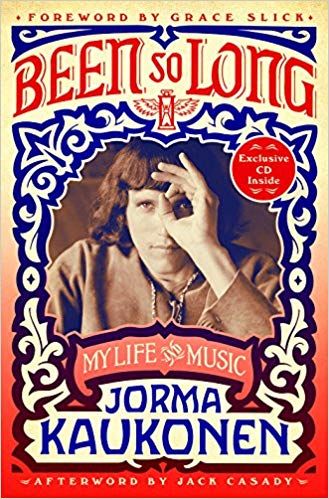 In the top echelons of rock, very few guitar pickers have attained the renown and respect that Jorma Kaukonen has. Voted 54th greatest guitarist by Rolling Stone Magazine, the master of blues-finger-picking, original founder of the Jefferson Airplane and Hot Tuna, Grammy nominee, and member of the Rock and Roll Hall of Fame (1996), has added “author” to his extensive list of achievements. His new memoir, “Been So Long,” is a no-holds-barred, in-depth-tell all; a wide expanse on his life, family and contributions as a musical pioneer who has weathered time, space and the rigors of the music business. Recently, Elmore writer Bob Girouard caught up with Kaukonen between gigs to discuss the why’s & wherefores of his autobiography, the recent announcement that Hot Tuna would be one of the featured acts on this 50th anniversary of the Woodstock Festival, and what’s next for a musician who has seemingly done it all already.
In the top echelons of rock, very few guitar pickers have attained the renown and respect that Jorma Kaukonen has. Voted 54th greatest guitarist by Rolling Stone Magazine, the master of blues-finger-picking, original founder of the Jefferson Airplane and Hot Tuna, Grammy nominee, and member of the Rock and Roll Hall of Fame (1996), has added “author” to his extensive list of achievements. His new memoir, “Been So Long,” is a no-holds-barred, in-depth-tell all; a wide expanse on his life, family and contributions as a musical pioneer who has weathered time, space and the rigors of the music business. Recently, Elmore writer Bob Girouard caught up with Kaukonen between gigs to discuss the why’s & wherefores of his autobiography, the recent announcement that Hot Tuna would be one of the featured acts on this 50th anniversary of the Woodstock Festival, and what’s next for a musician who has seemingly done it all already.
Elmore Magazine: Congratulations on Been So Long! It’s in-depth; very honest, and forthright. It also most likely took a lot of courage to write about both your successes and not-so-successes as a person. Also, congrats on Hot Tuna’s inclusion into this year’s Woodstock celebration.
Jorma Kaukonen: Yes, about Woodstock: Do you know we’re going on before the Russian band, “Pussy Riot?” [Laughs] To be honest, I’m honored that they asked me and Jack to play. They also have a lot of young acts on the bill which is awesome, Meaning, it’s not just a nostalgia show. In the spirit of the ’60s, Pussy Riot are revolutionaries. Plus, what’s not to like about the name? [Laughs]
EM: Your new book, Been So Long, is really in-depth. Plus you spare no one, especially yourself, and with the rare inclusion of your personal correspondence, it really pinpoints how your contributions as a rock pioneer have weathered time and space.
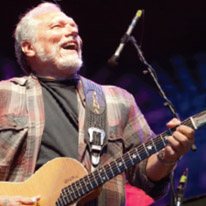
JK: The book took about two years to write, and thanks for the thumbs-up. One of the things that’s important to me is “Why should I pull any punches?” If I did, it would have been nothing but a hagiography. We all have stories to tell, and I’ve had an interesting life. When I got into writing it, much to my surprise, I really wasn’t self-conscious about myself and it’s not my purpose to dig up dirt on folks like Jerry (Garcia) or Janis (Joplin). Plus, I really enjoyed following my own footsteps through time. Finally, I figured if I couldn’t be honest about my own story there was no real point in writing this book.
EM: At the onset of the book, it appears that your childhood was close to idyllic: Your dad was in State Dept., and you moved a lot.
JK: There are pluses and minuses: The pluses? You get to travel all over the world, but the minuses were such that I missed the connections that I had with the people that were my best friends when I left.
EM: You are regarded as a master of finger picking blues guitar. What led you toward that style?
JK: That’s interesting because it’s one of those things that just called-out to me. What opened the door was that it was something I could do by myself. I wasn’t much of a “joiner,” and the finger-stylists for the most part played solo, and I like that completeness. I also liked the odd sense of community of people back in the day who loved that kind of music. We were all sort of odd ducks, if you will.
EM: As a purist in your early years, you actually shunned rock for more Americana (namely bluegrass and folk). Was it difficult to make the transition to rock?
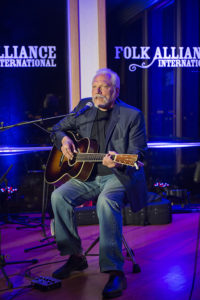
JK: I remember saying that, and all I can say is I was a pompous ass because I wouldn’t agree with that today. There needed to be a transition made because of the solo stuff I was playing in a band. So you need to learn what your “cog” needs to do in the machine. I remember talking to Jerry Garcia because he’d played in many kind of formats and was comfortable in all of them. I recognized that he would have some insights as to “how” to make that jump from being a solo guitarist to being a member of a band. One of the things he said to me is: “It’s what you don’t play that counts.”
EM: A pivotal moment in your life was inviting friend and co-musician, Jack Casady to join the Jefferson Airplane and later, Hot Tuna. Tuna has a great sense of history and pride. What began as a jam between Airplane sets has become an American musical institution celebrating 50-years! You and Jack have been music mates since you were kids (1958). To what do you attribute your success together?
JK: It’s a miracle on some levels. We’ve known each other since I was 16 and he was 13. We’ve always respected each other as men and artists. We’ve never had a band meeting, or been critical of each other’s aesthetic choices, musically, and we don’t interfere in each other’s lives.
EM: What do you feel defined the “San Francisco Sound?” Improvisation, amplified feedback, extended jams, or hallucinogenics?
JK: [Laughs]! All of the above! All were actually critical, but one of the things you must comment on is the freedom the S.F. artistic community gave all of us artists to try anything we wanted to do.
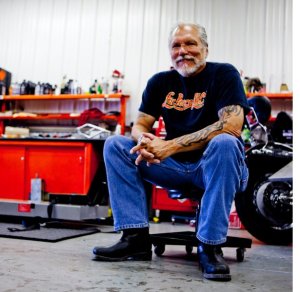 EM: Much of Been So Long focuses on your own inability to come to grips with your first marriage and the fact that a fair percentage of your life was spent dealing with extensive drug usage.
EM: Much of Been So Long focuses on your own inability to come to grips with your first marriage and the fact that a fair percentage of your life was spent dealing with extensive drug usage.
JK: I’m not the only one who has that story as far as substance abuse. It’s not a limited affliction. Looking back, part of who I’ve become over the years, and part of who I am now is inextricably entwined with both the good and bad aspects of my previous life. If someone who read my book has a problem with substance, they’ll understand that redemption is possible. I think that’s important.
EM: Teaching has now become a major factor in your life at the Fur Peace Ranch in Southeastern Ohio, (Pomeroy, OH) established.* 1989.What led to its development, and what made you choose that location?
JK: Well I lucked into the location. I was offered 126 acres for $32K. Even though I knew nothing about the area, it just seemed like a good idea. I had been teaching off and on since moving to California in 1962. I love the teaching aspect. My wife, Vanessa, is absolutely the love of my life, and we’re good partners and a great team. But aside from the mutual love and respect…she gets things done! [Laughs]
EM: How has the loss of your former Airplane bandmates, Spencer Dryden, Paul Kantner and Marty Balin affected you?
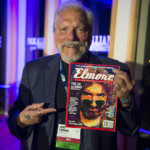
JK: It’s really brings it home that time is moving on. I miss those guys. It really makes me appreciate every single day.
EM: You have been able to address the changes in this nutty-ass business and remain an optimist. What’s next?
JK: First of all, it is a nutty-ass business. What’s lifted a burden from me is that at my age I don’t have to worry about becoming the “next new thing.” I don’t have the same kind of pressure on me that I had when we were young. I don’t care about that stuff anymore. I guess what I’m really looking forward to is to continue to play as best as I physically can, and to be able to remain competent as an artist. Finally, I would like to live long enough to see both my children grow into adulthood. That’s at the very top of my bucket list.




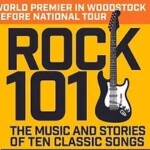


Be the first to comment!